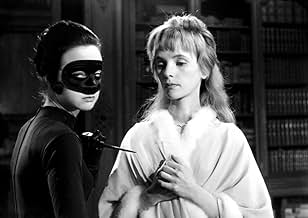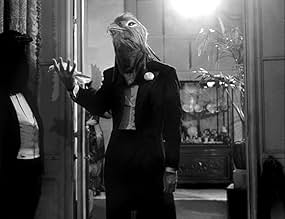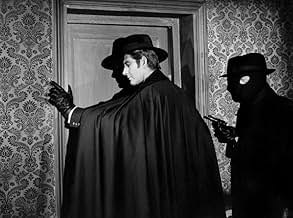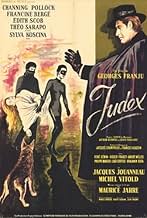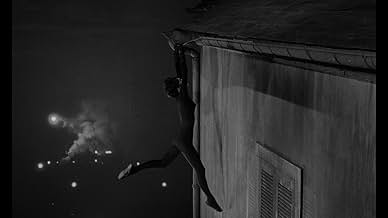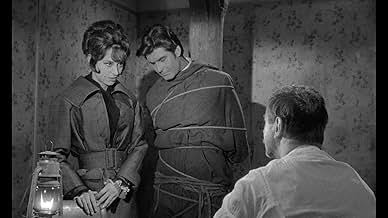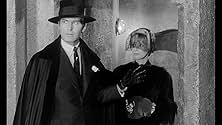Favraux, un banquier sans scrupules, reçoit une menace signée par "Judex," lui demandant de rembourser les personnes qu'il a escroquées. Il refuse et disparaît lors de son bal masqué, drogué... Tout lireFavraux, un banquier sans scrupules, reçoit une menace signée par "Judex," lui demandant de rembourser les personnes qu'il a escroquées. Il refuse et disparaît lors de son bal masqué, drogué et enfermé par Judex.Favraux, un banquier sans scrupules, reçoit une menace signée par "Judex," lui demandant de rembourser les personnes qu'il a escroquées. Il refuse et disparaît lors de son bal masqué, drogué et enfermé par Judex.
Histoire
Le saviez-vous
- AnecdotesAwarded the Coupe Jean-George Auriol 1963, by the jury's unanimous decision, in France.
- GaffesToutes les informations contiennent des divulgâcheurs
- Citations
Alfred Cocantin: What's all this about nuns?
- ConnexionsFeatured in Cinéma, de notre temps: Georges Franju, le visionnaire (1996)
Commentaire en vedette
I never had the opportunity to catch up with this one during my childhood and, for a long time, I had to make do with an intriguing still of the lead character in a large bird mask and holding what appears to be a dead dove. Three years ago, I managed to get hold of a VHS copy duped from what, reportedly, is the only French-language version (an extremely fuzzy 16mm print with barely-legible English subtitles) in existence! Its dire condition had affected my initial judgment and I didn't enjoy the film as much as I hoped I would. Then, two years later, Flicker Alley released the original 12-episode Silent serial of 1916-17 by Louis Feuillade (whose length totals over 5 hours) and I decided to try the Franju film again as a companion piece; this time, I was determined to overlook the deficiencies of the print and just go along for the ride - and, sure enough, it proved to be a much more rewarding experience! This third viewing, then, came by way of an Italian-dubbed 'variant' I recorded off TV which is in much better shape and, despite being apparently trimmed (95 mins. against the official 104), I opted to keep it as the former is a real chore to sit through!
Anyway, much as I admired the already wonderful Feuillade version (which, for the record, I also rate ***1/2), I found the later film - to my mind, an immensely satisfying compression of it - to be even superior because of its genuine touches of poetry and magic, even surrealism (such as the afore-mentioned costume party scene in which Judex - already hiding his true identity under an alias and his features behind layers of make-up - turns up donning a symbolic pigeon mask). In fact, the title role is played by real-life magician Channing Pollock which allows his celebrated act to be cleverly incorporated into the narrative!
I would venture to say that Franju's JUDEX is one of the best remakes ever made - fascinating, exciting and imaginative. The timing of its release (coming immediately prior to the espionage boom of the 1960s) ensured that the film also be viewed as a fond farewell to the days of old-fashioned crime (though gadgetry - soon to go overboard, i.e. when the James Bond extravaganzas descended to the level of a comic-strip - is still present, such as the mirror which allows Judex to peek at his captive and even communicate with him by writing on the glass panel itself).
For all his limitations as an actor, Pollock displays all the stoicism of the typical superhero and carries a genuine screen presence. Besides, Francine Berge' has to be one of the most captivating villainesses to ever grace the screen - utilizing several disguises in the realization of her evil schemes, none more fetching than the skin-tight black outfit (which she also sports when engaging in the climactic roof-top fight with an equestrienne, played by Sylva Koscina in a splendid cameo). Franju regular Edith Scob, then, is the doe-eyed heroine and there's also amiable support from the characters of the detective Cocantin and a resourceful boy who eventually becomes his sidekick. Another of the film's major assets is a subtly haunting score from Maurice Jarre (the last of eight collaborations with Franju, among them the latter's masterwork EYES WITHOUT A FACE [1960]).
The film - co-written by Jacques Champreux (grandson of Louis Feuillade!) and produced by Robert De Nesle (later associated with the dubious work of Jess Franco!) - is a veritable connoisseur's treat and a sheer delight from beginning to end. Franju later made the similar SHADOWMAN (1974; in which Champreux himself took the lead role!) but, by this time, such escapist fare was strictly old hat and, in any case, the result only worked in fits and starts. Another film in the same vein - which I own on VHS and I've been meaning to catch up with for some time - is the Russian-made 4½ hour Silent serial, MISS MEND (1926).
Anyway, much as I admired the already wonderful Feuillade version (which, for the record, I also rate ***1/2), I found the later film - to my mind, an immensely satisfying compression of it - to be even superior because of its genuine touches of poetry and magic, even surrealism (such as the afore-mentioned costume party scene in which Judex - already hiding his true identity under an alias and his features behind layers of make-up - turns up donning a symbolic pigeon mask). In fact, the title role is played by real-life magician Channing Pollock which allows his celebrated act to be cleverly incorporated into the narrative!
I would venture to say that Franju's JUDEX is one of the best remakes ever made - fascinating, exciting and imaginative. The timing of its release (coming immediately prior to the espionage boom of the 1960s) ensured that the film also be viewed as a fond farewell to the days of old-fashioned crime (though gadgetry - soon to go overboard, i.e. when the James Bond extravaganzas descended to the level of a comic-strip - is still present, such as the mirror which allows Judex to peek at his captive and even communicate with him by writing on the glass panel itself).
For all his limitations as an actor, Pollock displays all the stoicism of the typical superhero and carries a genuine screen presence. Besides, Francine Berge' has to be one of the most captivating villainesses to ever grace the screen - utilizing several disguises in the realization of her evil schemes, none more fetching than the skin-tight black outfit (which she also sports when engaging in the climactic roof-top fight with an equestrienne, played by Sylva Koscina in a splendid cameo). Franju regular Edith Scob, then, is the doe-eyed heroine and there's also amiable support from the characters of the detective Cocantin and a resourceful boy who eventually becomes his sidekick. Another of the film's major assets is a subtly haunting score from Maurice Jarre (the last of eight collaborations with Franju, among them the latter's masterwork EYES WITHOUT A FACE [1960]).
The film - co-written by Jacques Champreux (grandson of Louis Feuillade!) and produced by Robert De Nesle (later associated with the dubious work of Jess Franco!) - is a veritable connoisseur's treat and a sheer delight from beginning to end. Franju later made the similar SHADOWMAN (1974; in which Champreux himself took the lead role!) but, by this time, such escapist fare was strictly old hat and, in any case, the result only worked in fits and starts. Another film in the same vein - which I own on VHS and I've been meaning to catch up with for some time - is the Russian-made 4½ hour Silent serial, MISS MEND (1926).
- Bunuel1976
- 1 déc. 2006
- Lien permanent
Meilleurs choix
Connectez-vous pour évaluer et surveiller les recommandations personnalisées
- How long is Judex?Propulsé par Alexa
Détails
- Date de sortie
- Pays d’origine
- Langue
- Aussi connu sous le nom de
- Fantoma
- Lieux de tournage
- Château-Gaillard, Les Andelys, France(Judex's hideout)
- sociétés de production
- Consultez plus de crédits d'entreprise sur IMDbPro
- Durée1 heure 38 minutes
- Couleur
- Mixage
- Rapport de forme
- 1.66 : 1
Contribuer à cette page
Suggérer une modification ou ajouter du contenu manquant


